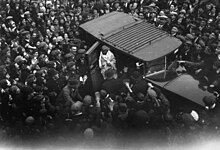
The Indian National Congress (INC) was founded in 1885 as a platform for educated Indians to voice their concerns under British rule. However, it was Mahatma Gandhi who transformed the Congress from an elite political body into a mass movement that mobilized millions across India. His entry into Congress politics marked a shift from constitutional methods of petitioning the British to large-scale civil disobedience and nonviolent resistance.
Gandhi’s Entry and Ideological Shift
When Gandhi returned to India from South Africa in 1915, the Congress was largely dominated by Western-educated leaders who sought gradual reforms within British rule. Gandhi, on the other hand, advocated for Swaraj (self-rule) through nonviolent struggle. His methods appealed directly to farmers, workers, and the lower castes, making the Congress a truly national party.
Key Contributions to Congress Politics
1. Champaran and Kheda Satyagraha (1917-1918)
Gandhi’s first major political interventions were the Champaran Satyagraha (to support indigo farmers in Bihar) and the Kheda Satyagraha (against unjust taxation in Gujarat). These struggles introduced his method of Satyagraha (truth-force), which became the backbone of Congress-led movements.
2. Non-Cooperation Movement (1920-1922)
Gandhi convinced Congress to launch the Non-Cooperation Movement, urging Indians to boycott British goods, institutions, and services. For the first time, Congress became a party of the masses, with peasants, merchants, and students actively participating. The movement, however, was called off after the Chauri Chaura incident in 1922.
3. Civil Disobedience and Salt March (1930)
In 1930, under Gandhi’s leadership, Congress launched the Civil Disobedience Movement with the famous Salt March (Dandi March), where Gandhi and his followers broke the British salt monopoly. This movement strengthened Congress’s position as the leading anti-colonial force in India.
4. Quit India Movement (1942)
During World War II, Gandhi led the Quit India Movement, calling for an immediate end to British rule. The Congress, now fully aligned with Gandhi’s vision, faced severe repression, with leaders imprisoned. This movement was one of the final blows to British colonial rule.
Congress After Gandhi
Gandhi’s assassination in 1948 marked the end of an era. The Congress, under Jawaharlal Nehru, continued his vision of a secular, socialist India but gradually moved towards electoral politics. Over the decades, the party has undergone ideological shifts, facing both successes and challenges in Indian democracy.
Legacy of Gandhi in Congress Politics
Even today, Gandhi’s ideals of nonviolence, Swaraj, and social justice remain central to Indian political thought. While the Congress has evolved, its foundational identity remains tied to Gandhi’s vision of an inclusive and democratic India.
Gandhi’s influence on Congress politics was transformative, turning it from a limited political organization into a mass movement that led India to independence. His principles continue to shape political discourse, reminding leaders of the power of nonviolence, people’s participation, and moral leadership.